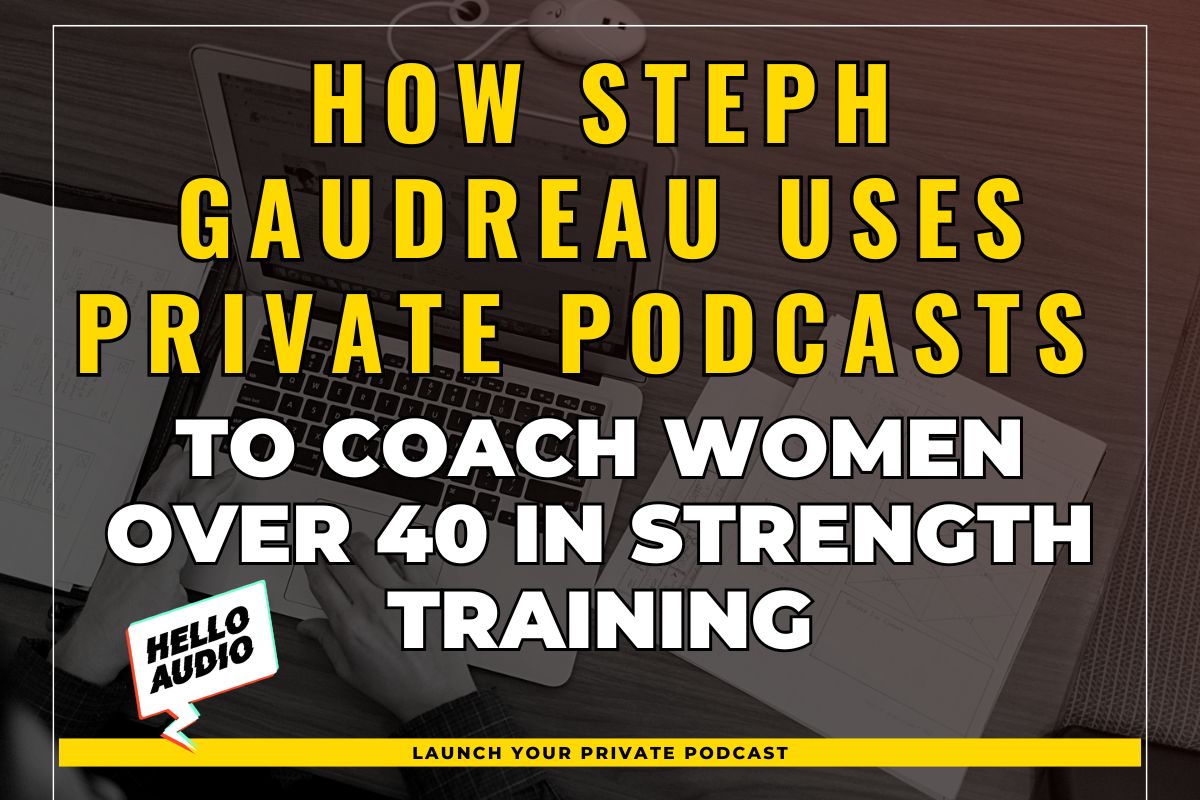There was once a time when people were only able to connect with others through virtual events. Even after that period, it stayed for all the right reasons.
Virtual events are a smart, intentional way to connect with people where they are. You can share your knowledge, launch new products, or even bring a community together. With virtual events, you can open doors that physical events often can’t.
The best part? With the right virtual event ideas, format, and platform, you can turn passive viewers into active participants and long-term advocates.
In this blog we’ll dive into the why, what, and how of hosting exceptional virtual events that gives you results.
But if you want your content to stay even after the event ends, turn it into audio feeds with Hello Audio. Keep your hard-earned value by turning the virtual event content into binge-worthy private podcasts.
Benefits of Hosting Virtual Events
Virtual events offer many opportunities to engage audiences, build relationships, and drive business outcomes while maintaining flexibility and reducing costs.
Whether you’re targeting clients, employees, or online community members, here are the key benefits of going virtual:
- Wider Reach, Lower Barriers: Virtual events completely eliminate geographical barriers, allowing you to connect with global audiences without the added costs of travel or venues.
- Cost-Effective: When compared to in-person gatherings, virtual events significantly reduce expenses on logistics, space, catering, and printed materials. This means higher ROI and budget flexibility for other marketing or business initiatives.
- Data-Driven Insights: Virtual platforms offer comprehensive analytics about the attendees’ engagement, content performance, and conversion rates. With these insights, you can refine future strategies and personalize follow-ups.
- High Flexibility and Scalability: Whether you’re planning to host 10-person conferences or a 10,000-attendee event, virtual formats are highly scalable with their easy pivot formats.
- Improved Accessibility: People have varying needs, time zones, and commitments, and with closed captions, on-demand playback, and flexible scheduling of virtual events, you can manage all that.
- Increased Engagement with Interactive Tools: Virtual platforms often include features like polls, Q&A, breakout rooms, and personification that keep participants engaged in real-time, even more than the traditional format.

Types of Virtual Events
There are various types of virtual events that cater to different purposes. When planning one for customers, clients, or a broader audience, you must choose formats that drive engagement, deliver value, and leave a lasting impression.
Here are seven virtual event types that can help you do that:
1. Webinars
Webinars are one of the most accessible and popular virtual event formats. They involve a speaker or a panel sharing their knowledge on a particular topic while the audience listens, learns, and generally participates through live Q&A.
Additionally, webinars are a great way to educate your audience, showcase your expertise, or launch your products. Best of all, they’re cost-effective and globally accessible.
2. Conferences and Summits
Virtual conferences bring together multiple sessions, keynote speakers, and even interactive panels on a digital platform. Think of it as a traditional conference but with no travel or logistic issues.
These events bring both passive and active participation, from watching thought leaders speak to networking events. Virtual summits are similar events, but their core focus is on the niche theme and bringing together top experts to share their insights with a global audience over one or more days.
3. Workshops
Workshops are nothing like webinars or conferences; they’re all about hands-on learning. Rather than just listening, an audience actively participates through various exercises, collaboration in small groups, or applying skills in real-time.
They’re ideal for creators, educators, and coaches who want to guide people through a process or help them achieve specific outcomes.

4. Concerts
Yes, you heard it right! Even live music has gone virtual, and it does not lack on any front. Virtual concerts allow followers from around the world to experience live performances.
These events are perfect for building engagement, fundraising, or delivering unforgettable entertainment online.
5. Networking Events
Anyone who attends an event wants content and to build healthy connections. Virtual networking events create those connections in online hallway chats or post-session meetups.
Attendees can hop into small-group conversations, engage in 1:1 video chats, and even access LinkedIn profiles in real-time. These events can be conducted standalone or complementary to larger virtual conferences, allowing participants to meet like-minded professionals and grow their networks.
6. Virtual Trade Shows and Exhibitions
Virtual exhibitions are a powerful medium for showcasing your products, services, or even artwork to a global audience.
With interactive booths, live product demos, downloadable resources, and real-time chats, attendees can explore and engage just like they would at a physical expo.
7. Career Fairs and Job Fairs
Virtual job fairs are an incredible opportunity for job seekers to meet employers in a flexible, accessible format. Attendees can visit virtual booths, attend webinars, and participate in live interviews, all from the comfort of their homes.
It’s a clever way for organizations to reach a wider talent pool without the logistical hassle.

11 Best Virtual Event Ideas
Whatever you plan to gain from virtual events, be it building a strong community, sharing knowledge, or energizing your audience, with the right virtual event format, you can brand and deliver measurable impact.
Here are 11 thoughtfully selected virtual event ideas that balance engagement, value, and accessibility, ideal for any business of any size:
1. Live Streaming or On-Demand Content
You can offer a mix of live and pre-recorded sessions to give your audience flexibility. Live content drives the energy and urgency that listeners need to take action, while on-demand sessions respect attendees’ time zones and schedules.
This hybrid approach increases accessibility and allows you to repurpose content across marketing channels later. One powerful way to do that? Convert your sessions into audio feeds, which your audience can revisit on the go.
With Hello Audio, it’s simple to turn your event recordings into binge-worthy podcasts that enhance retention, accessibility, and post-event impact. Sign up today!
2. Speed Networking Sessions
Think speed dating, but for professionals. Don’t worry. Only the format is like speed dating, but you’re not required to date. These sessions use timed breakout rooms to facilitate one-on-one or small-group chats that help attendees make quick, meaningful connections.
It has added features like conversation prompts, AI-powered matchmaking, and icebreaker games to lower social barriers. Post-event digital boards or chat rooms can help maintain the momentum an individual has built after the event ends.
3. Panel Discussion with Q&A
With virtual panel discussions, you can spotlight diverse perspectives and industry expertise. Bringing multiple experts together for a structured conversation offers attendees a dynamic and in-depth look at relevant topics.
To make the discussion interactive, integrate live Q&A via chat moderation and encourage audience engagement through polls and feedback.

4. Wellness Event
Events focused on wellness are a calculative way to support emotional, mental, and physical health while building a community and brand affinity.
Hosting wellness events shows that you have a clear commitment to holistic well-being. This can take many forms, such as guided meditation and breathwork sessions, expert-led discussions on stress management, interactive workshops, or virtual wellness challenges that encourage movement and mindfulness.
5. Virtual Book Club
Online book clubs can create a space for bookworms who want deeper conversations and community bonding. The format can include discussions around industry books, leadership themes, or fiction that sparks ideas.
You can enhance engagement with breakout rooms, author drop-ins, or supplemental materials. But even without those additional features, the audience stays glued because of the type of event. Since geography isn’t a barrier, these book clubs can bring in diverse perspectives from across the globe.
6. Yoga and Meditation Class
Virtual yoga and mindfulness sessions are a perfect way to help the audience recharge and destress. They’re easy to integrate into longer events or offer weekly community perks.
This type of event doesn’t take much effort, whether it’s chair yoga between talks or a guided meditation to start the day; these classes improve focus, reduce stress, and create a more human-centered experience.
7. Trivia Challenge
A trivia game challenge is one of those fun virtual event ideas that keeps your audience hooked. You can use general knowledge or customize questions to align with your brand, industry, or event theme.
To boost engagement, you can incorporate live leaderboards, team play, and small prizes. Tools like TriviaMaker or SocialPoint can help you set up the event without any issues.

8. Virtual Open Mic
A virtual open mic is a new-age idea for bringing communities together through authentic, user-generated content, whether it’s poetry, music, storytelling, or personal reflections; open mics literally give attendees the mic to express themselves in a supportive space.
This event format is especially effective for creative communities, internal team bonding, or brand-driven community building. You can give it a theme to align with your event’s larger purpose.
9. Virtual Escape Room
Another fun virtual event idea that is a favorite for building engagement. Attendees can solve puzzles and clues in a themed digital environment, promoting collaboration, creativity, and quick thinking.
Remember to choose themes that resonate with your audience and split attendees into teams for a more competitive twist.
10. Virtual Masterclass
Masterclasses are a great way to impart your skills and knowledge to your audience. They are great for deep skill-building around a topic relevant to your audience. You can work with a respected expert to deliver structured, hands-on learning that will mix theory with practical exercises.
Use the breakout rooms for collaboration and embed live demos and Q&A for a high-value experience. This is an ideal choice for lead generation, customer education, or internal upskilling.
11. Jam Session
If you have a creative community, a virtual jam session will be a relaxing getaway and an expressive way to connect. Musicians and even non-musicians can join in to play, improvise, or simply enjoy the performance.
You don’t need professional instruments for this event; you can use everyday objects or simple instruments to add charm and build team spirit.

Best Platforms for Virtual Events
The right platform will make your event a success, and the wrong one can derail it badly. Platforms affect attendee experience, engagement levels, and the overall outcome of the event.
Here are the five best platforms, each with its own strengths:
Zoom Events
This platform is best for webinars, hybrid events, and conferences. Zoom’s event-specific suite offers tools for multi-session conferences, ticketing, networking, and analytics with a familiar interface.
It is scalable to thousands of attendees and offers reliable streaming and breakout rooms.
Airmeet
If you’re looking to host a networking or community event, Airmeet is the right place. It focuses on attendee engagement with features like social lounges, speed networking, and Q&A.
It is ideal for events that prioritize community building and interactive sessions. It offers virtual tables, lounge areas, gamification, live reactions, and a smooth UX for both hosts and attendees.
Webex Events
Backed by Cisco, Webex Events offers robust security and end-to-end event management. It’s great for corporations needing compliance, integrations, and multilingual support.
This platform can host enterprise-level and global events; it offers real-time translation and accessibility features.
vFairs
vFairs is one of the best platforms for creating an immersive experience through 3D booths or auditoriums. It offers virtual exhibitor booths for hosting a virtual expo, trade show, or job fair.
This platform also offers multi-language and accessibility features with 24/7 technical support.
Hopin
Hopin offers a full-fledged virtual venue with stages, expo booths, breakout rooms, and networking areas. With a capacity to host large virtual and hybrid events, it offers high-quality production with multiple tracks.
You can personalize the branding and interactivity in the app and also get advanced analytics features.

Best Practices for Planning and Hosting Virtual Events
Now that you know which format to follow and which platforms to use, you also need strategic planning for post-event follow-up.
Here are some virtual event best practices to become your guiding light in your process:
- Make Clear Goals and KPIs: You need to begin by defining your objectives, like lead generation, training, or product launch, and identifying key performance indicators (KPIs) to measure outcomes.
- Know Your Audience: Personalize your content based on your audience’s preferences. Understanding their needs will help you shape relevant topics, session formats, and speaker selection.
- Choose the Right Platform: Select a platform that supports your format and functionality needs — from breakout rooms and polls to live streaming and analytics.
- Curate High-Value Content: To attract and retain attendees, you need quality content. To keep things dynamic, you can mix formats like panel discussions, live Q&A, and workshops.
- Promote Early and Widely: Start promoting your event at least 4-6 weeks in advance. Use email, social media, partner collaborations, and even retargeting ads to maximize visibility.
- Provide Flexibility with On-Demand Access: Make your content accessible post-event so that people who couldn’t attend the live event or want to revisit content can easily do so.

Virtual Event Planning Mistakes You Should Avoid
Having the best idea for a virtual event is not enough. There are multiple reasons why your idea can fall flat. You need to execute the plan correctly and also keep an eye on avoidable mistakes.
Here are some common mistakes to avoid during virtual event planning:
- Neglecting Audience Engagement: It’s common to have a passive audience in your virtual event, so avoid treating it like a one-way broadcast. Instead, include interactive elements like Q&A sessions, polls, etc.
- Choosing the Wrong Platform: Picking the wrong platform can limit engagement and create a disjointed experience, be it networking, breakout sessions, or live streaming. Match your tech stack to the format and scale of your event.
- Underestimating Tech Preparation: Issues like poor audio, video, or connectivity can derail your event. Check everything in advance, offer a speaker onboarding session, assign a dedicated tech moderator, and have a backup plan ready in case of glitches.
- Lack of Clear Objectives: If you don’t know why you’re planning a virtual event, it’s difficult to measure success. Know what you aim to achieve and align your agenda and metrics accordingly.
- Skipping Promotion: Without promotion, even the best event won’t draw a crowd. Focus on virtual event marketing early through multiple channels with a clear content calendar.
- Forgetting Post-Event Follow-Up: The event doesn’t end when the screen turns off. You must follow up with attendees through thank-you emails, on-demand content, feedback surveys, and next-step calls to action.

Frequently Asked Questions (FAQs)
To further help you understand virtual events, here are some commonly asked questions:
How Can I Ensure High Attendance in a Virtual Event?
To drive high attendance, offer a clear value proposition to your audience, such as “What will they gain by joining?” Advertise your event via email, social media, or partner networks, and use early-bird registration or exclusive content to spark excitement.
Send timely reminders and calendar invites, and make the registration process simple and mobile-friendly to improve turnout.
How Can I Measure the ROI of a Virtual Event?
Measuring ROI is not just counting the number of attendees; here are more indicators that show ROI:
- Engagement metrics, like chat activity, poll responses, and session attendance.
- Lead generation, such as gaining new contacts and qualified leads after the event.
- Sales impact via conversion rates and pipeline growth.
- Audience satisfaction through post-event surveys.
Many platforms offer built-in analytics to help track and evaluate these metrics effectively.
Are Virtual Events Cost-Effective Compared to Physical Events?
Yes, without any doubt! Virtual events don’t need venues, travel, lodging, catering, or printed materials; organizers save significantly on logistics.
Additionally, virtual tools can scale more easily, so you can influence a larger audience without exponentially increasing your budget. Plus, the ability to repurpose content into podcasts, slide decks, and session highlights extends the event’s value long after it ends.
Conclusion
Virtual events have moved far beyond just staring at a flat screen, they’ve become immersive, and help you build relationships, spark conversations, and scale your message to a global audience.
With the right formats, platforms, and customer engagement ideas you can create events that are not only memorable but also measurable.
Virtual events give you an opportunity to meet your audience where they are, on their terms and in their time. The best events don’t end when the camera turns off; they evolve into lasting conversations.
With Hello Audio, you can keep the momentum going by turning your event recordings into private audio feeds. This extends the life and reach of your content, and your audience can take action long after the event is over.
Sign up to turn your one moment into an ongoing impact!












